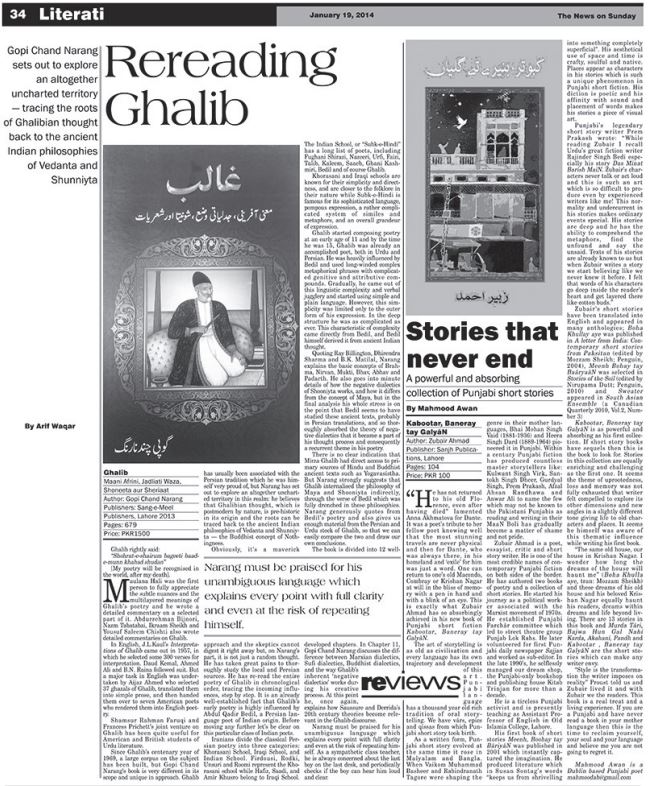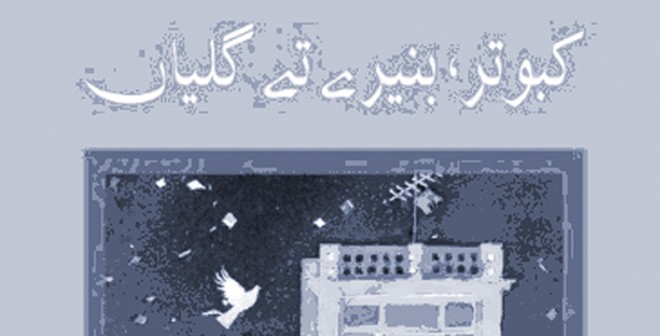The art of storytelling is as old as civilisation and every language has its own trajectory and development of this art. Punjabi language has a thousand year old rich tradition of oral storytelling. We have vãrs, epics and qissas from which Punjabi short story took birth.
As a written form, Punjabi short story evolved at the same time it rose in Malyalam and Bangla. When Vaikom Muhammad Basheer and Rabindranath Tagore were shaping the genre in their mother languages, Bhai Mohan Singh Vaid (1881-1936) and Heera Singh Dard (1889-1964) pioneered it in Punjabi. Within a century Punjabi fiction has produced countless master storytellers like: Kulwant Singh Virk, Santokh Singh Dheer, Gurdyal Singh, Prem Prakash, Afzal Ahsan Randhawa and Anwar Ali to name the few which may not be known to the Pakistani Punjabis as reading and writing in their MaaN Boli has gradually become a matter of shame and not pride.
Zubair Ahmad is a poet, essayist, critic and short story writer. He is one of the most credible names of contemporary Punjabi fiction on both sides of the border. He has authored two books of poetry and a collection of short stories. He started his journey as a political worker associated with the Marxist movement of 1970s. He established Punjabi Parchãr committee which led to street theatre group Punjab Lok Rahs. He later volunteered for first Punjabi daily newspaper Sajjan and worked as sub-editor. In the late 1990’s, he selflessly managed our dream shop, the Punjabi-only bookshop and publishing house Kitab Trinjan for more than a decade.
He is a tireless Punjabi activist and is presently teaching as Assistant Professor of English in Old Islamia College, Lahore.
His first book of short stories Meenh, Boohay tay BãriyãN was published in 2001 which instantly captured the imagination. He produced literature which in Susan Sontag’s words “keeps us from shrivelling into something completely superficial”. His aesthetical use of space and time is crafty, soulful and native. Places appear as characters in his stories which is such a unique phenomenon in Punjabi short fiction. His diction is poetic and his affinity with sound and placement of words makes his stories a piece of visual art.
Punjabi’s legendary short story writer Prem Prakash wrote: “While reading Zubair I recall Urdu’s great fiction writer Rajinder Singh Bedi especially his story Das Minat Barish MaiN. Zubair’s characters never talk or act loud and this is such an art which is so difficult to produce even by experienced writers like me! This normality and undercurrent in his stories makes ordinary events special. His stories are deep and he has the ability to comprehend the metaphors, find the unfound and say the unsaid. Texts of his stories are already known to us but when Zubair writes a story we start believing like we never knew it before. I felt that words of his characters go deep inside the reader’s heart and get layered there like cotton buds.”
Zubair’s short stories have been translated into English and appeared in many anthologies; Boha Khullay aye was published in A letter from India: Contemporary short stories from Paksitan (edited by Mozzam Sheikh; Penguin, 2004), Meenh Bohay tay BaãryaãN was selected in Stories of the Soil (edited by Nirupama Dutt; Penguin, 2010) and Sweater appeared in South Asian Ensemble (a Canadian Quarterly 2010, Vol.2, Number 3)
Kabootar, Beneray tay GalyãN is as powerful and absorbing as his first collection. If short story books have sequels then this is the book to look for. Stories in this collection are equally enriching and challenging as the first one. It seems the theme of uprootedness, loss and memory was not fully exhausted that writer felt compelled to explore its other dimensions and new angles in a slightly different tone giving life to old characters and places. It seems he himself was aware of this thematic influence while writing his first book.
“The same old house, our house in Krishan Nagar. I wonder how long the dreams of the house will haunt me” (Boha Khulla aye, tran: Mozzam Sheikh) and these dreams of his old house and his beloved Krishan Nagar equally haunt his readers, dreams within dreams and life beyond living. There are 13 stories in this book and Murda Tãri, Bajwa Hun Gal Nahi Karda, Akahani, Pandh and Kabootar , Baneray tay GalyãN are the short stories which can make any writer envy.
“Style is the transformation the writer imposes on reality” Proust told us and Zubair lived it and with Zubair we the readers. This book is a real treat and a living experience. If you are a Punjabi and have never read a book in your mother language then this is the time to reclaim yourself, your soul and your language and believe me you are not going to regret it.
Published on January 19, 2014 in The News on Sunday Literati Page.
https://www.thenews.com.pk/tns/detail/554550-stories-never-end


